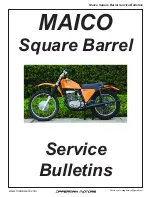
9
RIDING INSTRUCTIONS
32
9.3
Starting off
Info
Switch on the light before riding the motorcycle. You will then be seen earlier by other motorists.
When you are riding, the side stand must be folded up and secured with the rubber band.
–
Pull the clutch lever, engage 1st gear, release the clutch lever slowly and simultaneously open the throttle carefully.
9.4
Shifting, riding
Warning
Danger of accidents
If you change down at high engine speed, the rear wheel can lock up.
–
Do not change into a low gear at high engine speed. The engine races and the rear wheel can lock up.
Info
If you hear unusual noises while riding, stop immediately, switch off the engine, and contact an authorized KTM workshop.
First gear is used for starting off or for steep inclines.
–
When conditions allow (incline, road situation, etc.), you can shift into a higher gear. To do so, release the throttle while simulta-
neously pulling the clutch lever, shift into the next gear, release the clutch, and open the throttle.
–
After reaching maximum speed by fully opening the throttle grip, turn the throttle back so it is ¾ open. This will barely reduce the
speed but fuel consumption will be considerably lower.
–
Always open the throttle only as much as the engine can handle
–
abrupt throttle opening increases fuel consumption.
–
To shift down, apply the brakes and close the throttle at the same time.
–
Pull the clutch lever and shift into a lower gear, release the clutch lever slowly and open the throttle or shift again.
–
Switch off the engine if you expect to be standing for a long time.
Guideline
≥
2 min
–
Avoid frequent and longer slipping of the clutch. This heats the engine oil, the engine, and the cooling system.
–
Ride with a lower engine speed instead of with a high engine speed and a slipping clutch.
9.5
Braking
Warning
Danger of accidents
If you brake too hard, the wheels can lock.
–
Adapt your braking to the traffic situation and the road conditions.
Warning
Danger of accidents
Reduced braking efficiency caused by spongy pressure point of front or rear brake.
–
Check the brake system and do not continue riding. (Your authorized KTM workshop will be glad to help.)
Warning
Danger of accidents
Reduced braking efficiency due to a wet or dirty brake system.
–
Clean or dry a dirty or wet brake system by riding and braking gently.
–
On sandy, wet or slippery surfaces, use the rear brake.
–
Braking should always be completed before you go into a bend. Change down to a lower gear appropriate to your road speed.
–
On long downhill stretches, use the braking effect of the engine. To do so, shift back one or two gears, but do not overrev the
engine. You will need to apply the brakes far less often and the brake system will not overheat.
















































